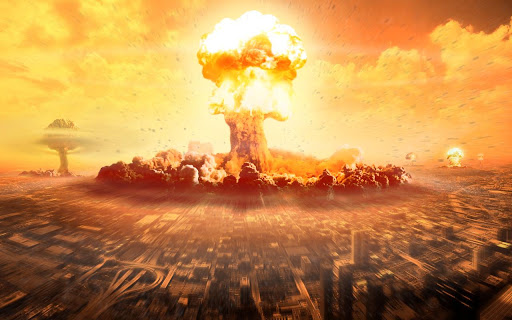BY: Political Economy Journal Team

PEJOURNAL – This Thursday morning, an incident took place on the Iran’s nuclear facilities in Natanz, during which one of the huts under construction in the open area of Natanz site was damaged.
Following this incident, some Israeli media accounts immediately attributed the incident to Israel’s destructive actions, same procedure which was followed by the Zionist regime’s media sources regarding the explosion of the gas tank in Parchin area in Tehran, capital city of Iran, some days before.
Regarding the Parchin incident, the relevant authorities released the full video from the location, provided the necessary explanations, and it became clear that the above incident had nothing to do with sabotage, cyber, etc. According to Iranian officials and the International Atomic Energy Agency (IAEA), the incident on Thursday in Natanz nuclear facilities also, did not lead to the release of any nuclear or radioactive material, but any unforeseen events in nuclear facilities around the world immediately raises serious concerns in the international community due to radioactive release. However, regardless of the claims made by the Zionist regime’s media sources, it is necessary to pay attention to a few points in this regard:
1. Some officials, including the Prime Minister and former Secretary of Defense of the Zionist regime, the US Secretary of State, Brian Hook, and some other political, military and security officials, have repeatedly stated their readiness and intention to strike at military and nuclear facilities which faced with Iran’s explicit statements.
2- The recent unprecedented and illegal action of the IAEA, which led to the issuance of a resolution by the Board of Governors under the pressure of the United States and the European scene, has also been followed by an approach to increasing political and security pressures against our country.
3. The UN Secretary-General’s unlawful and biased report at the recent Security Council meeting on how to implement Resolution 2231, which called into question Iran’s response to the US withdrawal from the UN Security Council and was strongly opposed by China and Russia, as another pressure to force it. Iran is notorious for waiving its natural and legal rights.
4. The proposed US resolution aimed at circumventing Security Council Resolution 2231 and continuing Iran’s arms embargo, which has been strongly opposed by Russia and China, and by European Security Council members, is another link in the chain of political pressures.
5. Continuation of US unilateral and unilateral sanctions, pursued as part of a strategy of maximum pressure, in addition to the commitment of European countries to fulfilling their commitments, is another important part of a comprehensive effort that aims to weaken Iran’s economic, defense and political strength. The war of the parties to break the will and resistance of the Iranian people against coercion, extravagance and extortion of the system of domination.
6- Iran has so far tried to prevent the escalation of the crisis and the formation of unpredictable conditions and situations by defending its principled positions and national interests with intelligence and strategic tact, but if there are signs of the passage of hostile countries, especially the Zionist regime and the United States. The red lines of the Iran, which are the security, interests and peace of the Iranian people, must be expressed in any way. Definitely, the strategy of confrontation and confrontation with the new situation must be fundamentally reconsidered.

On the other hand and considering the points mentioned above, although regardless of the reasons for these occurrences, it once again drew the attention of the international community to the issue of global duty to protect the security of nuclear facilities.
Following the incident on the Natanz nuclear site, the Western, Hebrew, and Arabic media outlets sought to link the incident to the Israel’s cyber and operational capabilities, a symbol of the regime’s promises to take advantage of all options to pursue the suspension of Iran’s nuclear program.
However, since the beginning of this incident, the officials and authorities of the Zionist regime, by adopting a policy of silence, have tried not to take an active position on this incident and as mentioned above, they only stated their readiness and intention to strike at Iran’s military and nuclear facilities, but naturally, the creation of a space for the media mostly based on a report by David Albright of the Institute for Science and International Security ( ISIS ) and his colleagues Sarah Burkhard, and Frank Pabian , many of which are directly and indirectly related to this regime, will have consequences for the Israeli regime.
The sensitivity and importance of this issue becomes clear when the issue of the nuclear nature of the Zionist regime and Israel’s proven vulnerabilities to counter-reactions is considered. Naturally, if the areas of confrontation cross the red lines and enter areas that could potentially endanger regional and global security and health, then imaginary models such as the “Tehran series” cannot be fed to the international community.
Perhaps using media tools to show a fake face of strong regime but in reality politically fragile, security, and social problems at home and a crisis of legitimacy and acceptance in the international community may have short-term benefits for its leaders, but exceeding accepted global norms and the conceptualization and production of literature on the subject of hitting nuclear centers could certainly have irreparable consequences for international peace and security.
Unfortunately, the formation of a false and utilitarian image in some extremist decision-makers in the United States and Israel regarding pursuing a policy of maximum pressure using political-media tools against Iran and abusing the capacity of some international organizations in this direction has led to unintended consequences. The anticipation of these measures would jeopardize international peace and security and the possibility of a rift in the accepted norms of global care and protection of nuclear facilities. Naturally, if the international community does not live up to its responsibility to deal quickly and decisively with the aforementioned dangerous atmospheres and norms, and if political approaches outweigh the legal and security requirements, these actions cannot be expected to remain in the minds of the Zionist regime and Trump and don’t become a worrying practice worldwide.